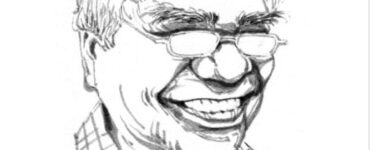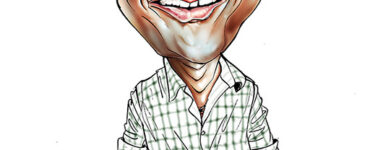 I would have been two when The Satanic Verses was published and almost three when the fatal fatwa was issued against its creator. As I write this around the anniversary of the shocking 12th August attack on Rushdie last year, I am thirty-seven and still at a loss to realize that while I have travelled (or been compelled to travel) through infancy, childhood, adolescence, adulthood, parenthood (and other possible hoods that one can visualize attending upon an individual at my station in life), the world around me has remained, strictly and stubbornly, unchanged and firm in its errors. “True closure, however, may require more than the killing of one man,” writes Rushdie in a piece on Osama Bin Laden, and of the case of The Satanic Verses that has had its share of around eleven deaths and sixty-one injuries so far, no statement could hold more true.
I would have been two when The Satanic Verses was published and almost three when the fatal fatwa was issued against its creator. As I write this around the anniversary of the shocking 12th August attack on Rushdie last year, I am thirty-seven and still at a loss to realize that while I have travelled (or been compelled to travel) through infancy, childhood, adolescence, adulthood, parenthood (and other possible hoods that one can visualize attending upon an individual at my station in life), the world around me has remained, strictly and stubbornly, unchanged and firm in its errors. “True closure, however, may require more than the killing of one man,” writes Rushdie in a piece on Osama Bin Laden, and of the case of The Satanic Verses that has had its share of around eleven deaths and sixty-one injuries so far, no statement could hold more true.
My first brush with Rushdie was at thirteen when I had unwittingly picked up The Moor’s Last Sigh during a library period in school. Needless to say, I had understood nothing and in those pre-google days, could be amply forgiven for eschewing a self-propelled inquiry on the book’s meaning, and for returning it at the week’s end with indignant spite for the author for having waylaid me from Wodehouse. I did not encounter Rushdie again till he arrived, innocuously and indiscriminately, packed into my undergraduate literature syllabus five years later but once I had grudgingly read Midnight’s Children, a door opened in me for ever. Over the years, Rushdie’s writing has been a valued friend, a trustworthy mentor, and a perennial source of good cheer. Most importantly, it has been an abiding site for negotiations with sanity in an idiom that is determined to be as fluid as life.
To readers gutted with realist fiction on every side, the Rushdie world or to summon a better word, Rushdiewood comes as a highly desirable respite. In its crucible, fable, fact, fantasy and entertainment generously combine to deliver literary capsules that have little precedent in their unanimous verbosity, plenitude, glamour, audacity and flamboyance. The real and the unreal, the probable and the improbable, the possible and the impossible – all unplug themselves from binary positions here to engage with the linguistic and philosophical duty of signification in a carnivalesque play of différance. There is nothing that can be taken for granted in Rushdie’s fiction and the creator ensures that such elaborate and intense fictiveness of his textual world is self-consciously maintained and realized at every turn through incident, character and dialogue. “…from the earliest times, we were narrative animals,” he insists, and as a writer, he has gravitated towards the responsibility of upholding the freedom, integrity and inherent interest of narratives at all costs.
This is not to say that his fictional world is entirely self-referential or isolated from the pressing concerns of life. If anything, Rushdie’s writing, doggedly and gloriously, inhabits life’s damaged sinews, its torn ligaments, its rude and scattered paradoxes, and its essential irreconcilability. What keeps it from descending into realism, however, is his refusal to look at life with one eye, even if it is the third eye. Committed to the many, Rushdie’s constant aesthetic project has been to give voice and agency to this intrinsic plurality of existence of thought, idea, belief, faith, language, and hope, and the task of accommodating plurality, whether in aesthetics or politics, involves its potent and idiosyncratic set of challenges.
To the challenge of accommodating heterogeneity, Rushdie’s response has been native. Drawing upon Eastern and chiefly Indian oral traditions of storytelling, Rushdie has privileged the many over the one by happily deviating from the real. His stories unfold in strange lands, his characters shape-shift and time-travel, and his narrative technique is abrupt in its cinematic affinities. However, the unreal in Rushdie is far from irrelevant or untrue. Rather, as the writer himself points out, it is an attempt to catch the truth at a tangent, to find another route to it through another level of comprehension or introjection. Thus, the past/history is Rushdie’s much-frequented terrain as he goes about making sense of all that is through all that was and that will be.
What is worth observing here is that Rushdie’s consistent inquiry in his fiction is not into some absolute, available truth but into ways of approaching, apprehending or assigning the idea of truth in and to life. His life’s work has been the interrogation of limitations to thought and the assertion of freedom and difference. Concerned with multiple diachronic and synchronic ways of seeing than with sight or vision itself, Rushdie’s writing disturbs orthodox epistemes in its intention and energy not of heralding the impossible but of refusing to limit the possible. Fantasy and humour become, thereby, potent tools of dismantling hierarchies of knowledge and subverting sanctity with profanity in the interests of epistemological unpacking and reconsideration.
This, again and however, is not to say that the dispute over The Satanic Verses has no ground. In art, as in life, one abides by respect for the opinions of others and honours their right to the freedom of expression – of consent, dissent, appreciation and offence. The turn from liberal humanism to critical theory was, after all, based on the affirmation of the politics of difference, and criticism and interpretation continue to be animated spheres primarily because of thriving debates. But the translation of offence to violence and the threat to creative freedom on such grounds should have no place in a world not peopled by troglodytes.
Today, Rushdie’s case is far from unique or isolated. Regimes of oppression the world over are disciplining individuals and putting them in their places by a travesty of freedom, nationalism, secularism, democracy and justice. Fanaticism and bigotry are ruling the roost and the reflective voice is gagged with punitive threats against sedition and unparliamentary language. In the midst of this unnerving chaos, it is only writers like Rushdie who, by emboldening us to succumb to the rush of questions, can still show a way out. And with light and dark theatrically playing in his gaze, now more defiantly than ever, one is convinced that the questions will not cease just yet.
*









One of the best pieces I have read on Salman Rushdie’ s art and craft. It’s a befitting tribute to his contribution as a voice against the fundamentalism of all sorts be it religion or the state.
Your optimism about the continuation of a sustained fervor, among successive writers, of questioning the power is indeed a morale booster in an otherwise suffocating atmosphere.
Congratulations Basudhara!